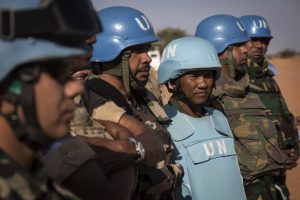Nepal became a member of the United Nations 65 years ago, on December 14, 1955. To celebrate the occasion, here are five little known facts about Nepal and that world body.
Nepal Applied for U.N. Membership in 1949
Nepal proposed to become a U.N. member in 1949. On July 22, 1949, on behalf of Nepal’s government, Major-General Bijaya Shamsher, director-general of foreign affairs, wrote letter to the U.N. expressing the country’s interest in becoming a member. In the 27-page letter, Shamsher had detailed Nepal’s position as a sovereign country in South Asia since the U.N.’s inception. It also referenced Nepal’s diplomatic treaties with the United Kingdom, the United States, France, and India. Nepal’s oldest diplomatic relationship has been with the U.K., which started in 1816. Nepal established diplomatic relations with the U.S. on April 25, 1947, with India on June 13, 1947, and with France on April 20, 1949.
The Soviet Union Vetoed Nepal’s Membership
Nepal’s U.N. membership application in 1949 was rejected by the Security Council due to a veto against it by the Soviet Union on September 7, 1949 This news even made it to the New York Times. The newspaper wrote: “The Himalayan Kingdom of Nepal was kept out of the United Nations today by the thirty-first veto registered by the Soviet Union.”
Sri Lanka Also Became a U.N. Member in 1955
Nepal obtained its U.N. membership together with Sri Lanka from South Asia in 1955. Before Nepal and Sri Lanka, India (1945), Afghanistan (1946), and Pakistan (1947) were the other U.N. members from the region. Fourteen other nations became U.N. members along with Nepal and Sri Lanka: Austria, Albania, Bulgaria, Cambodia, Finland, Hungary, Ireland, Italy, Jordan, Laos, Libya, Portugal, Romania, and Spain. Interestingly, in the seven years between Nepal’s U.N. membership application and its acceptance, Kathmandu just added one more country to the list of its formal diplomatic relationships: China, with whom it established formal ties on August 1, 1955.
Nepal Sent a Permanent Representative to the U.N. in 1956
Despite its formal entry to the U.N. in 1955, Nepal sent its first permanent representative to the U.N. a year later. Nepal’s first permanent representative to the U.N. was Rishikesh Shaha, who served in the post from 1956 to 1960. Shaha, in his autobiography, noted that he arrived in New York City in October of 1956. Despite being Nepal’s first permanent representative to the U.N., Shaha made an enormous impression on world leaders and other U.N. representatives, so much so that the was appointed chairman of the international commission formed to investigate the death of the then-U.N. Secretary General Dag Hammarskjold in 1961 in a plane crash in then Northern Rhodesia (now Zambia).
Nepal Is the Fourth Largest Contributor of U.N. Peacekeeping Troops
Despite the relatively small size of its military, Nepal is among the top four troops-contributing countries for U.N. peacekeeping missions worldwide. Given that there are 193 U.N. member states, this ranking, some military observers say, is a big success for Nepal.
According to the U.N., there are currently 70,000 U.N. peacekeepers worldwide, popularly known as the “Blue Helmets.” U.N. peacekeeping is an integral part of Nepal’s military contribution to the cause of world peace. Nepalese peacekeepers are stationed in Congo, South Sudan, Sudan, Western Sahara, Israel, Lebanon, Mali, Syria, Central African Republic, Iraq, and Libya.
Nepal started contributing to U.N. peacekeeping missions just three years after gaining its U.N. membership. In 1958, five military observers from the Nepal Army were deployed in Lebanon under the banner of the United Nations Observation Group. The Nepal Army deployed its first batch of troops for a U.N. peacekeeping mission in Egypt in 1974. The pioneering peacekeeping contingent was from the Purano Gorakh Battalion. According to the Nepal Army, 68 Nepal Army personnel have died discharging their duties as Blue Helmets. In addition, 66 personnel have been physically disabled on the job as U.N. peacekeepers. Nepalese peacekeepers have also received various medals for their contributions.

































